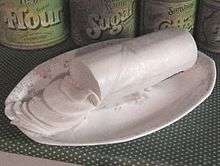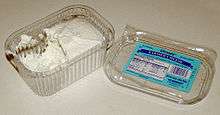Farmer cheese


In the United States, farmer cheese (also farmer's cheese or farmers' cheese) is pressed cottage cheese, an unripened cheese made by adding rennet and bacterial starter to coagulate and acidify milk. Farmer cheese may be made from the milk of cows, sheep or goats, with each giving its own texture and flavor.
During coagulation the mixture separates into curds (solid) and whey (liquid), then the whey is drained off.[1] Further pressing out of the moisture yields the malleable solid results of pot cheese, while even more pressing makes farmer cheese, which is solid, dry and crumbly.
Farmer cheese is often used for fillings in blintzes, pierogi and other foods. It is sometimes rolled in a mixture of herbs and flavorings or wrapped in very thin slices of flavorful smoked meats. It can also be used as a spread on bread.
Other meanings and varieties
Many similar varieties of fresh cheese are produced worldwide.
America
In the Upper Midwest of the US, farmer's cheese is a semi-soft white cheese made from part-skim milk.[2]
In Canada the term farmer's cheese means a kind of hard, rindless white cheese which is firm but springy in texture with a mild, milky and buttery flavor which may be used in a way likened to colby or cheddar.
In Mexico and several other Latin American countries, a local variety of farmer cheese is known as queso blanco.
Africa
Farmer's cheese is called wagashi or waagashi (pronounced: waa-ga-she) in Ghana and wagasi in Benin.[3] It is made by Fulani women using grass-fed cow milk and Xylopia aethiopica leaves and its supple stems as the curdling agent. Waagashi may be eaten raw. Due to its ability to resist melting upon contact with heat, it is often fried and eaten with a spicy peanut powder or used in vegetarian soups and stews in the same way as tofu or paneer. Waagashi that is salted, baked, smoked or grilled has added flavor and a longer shelf life.
Asia
See more: Paneer
South Asian farmer cheese (Pashto چکه Urdu پنیر Hindi पनीर Bengali পনির) is curdled with an edible acid such as vinegar or lemon juice, rather than rennet. It is commonly eaten in Afghanistan, Pakistan, India, and Bangladesh. However, farmers' cheese in the US is strictly not the same product as the one in South Asia. Here it is firm and cookable as it does not melt when cooked or heated.
Europe
French Neufchâtel is a ripened farmer cheese,[4] while fromage blanc is a fresh and creamy variety. In French, the term "farmer's cheese" (fromage fermier, fromage de ferme or produit fermier) refers to farmstead cheese, i.e., any type of cheese that was made using traditional techniques on the farm that the milk came from.
Quark in Germany or topfen in Austria is an unripened farmer cheese which is often very creamy. More firm versions of it are produced in other countries of Central and Eastern Europe. These are e.g. túró in Hungary,[5] tvaroh in the Czech Republic and Slovakia[6] twaróg in Poland,[7] and tvorog[8] in Russia. Traditionally, rennet is not added in the production of these cheeses.
References
- ↑ How to Make Farmer's Cheese
- ↑ Crystal Farms
- ↑ P. Sessou, S. Farougou, P. Azokpota, I. Youssao, B. Yèhouenou, S. Ahounou. Endogenous methods for preservation of wagashi, a Beninese traditional cheese. African journal of agricultural research, 8 (2013) 4254-4261. doi:10.5897/AJAR2013.6908
- ↑ Making Neufchatel Cheese
- ↑ Túró Recipe
- ↑ Making tvaroh cheese,
- ↑ Dairy products typical of Polish cuisine — cream, cheese, twarog, eggs
- ↑ "The Ultimate Champions' Breakfast Cottage Cheese (Tvorog) Recipe". Nerdy Green Mom. Retrieved 2016-01-10.
External links
- A recipe for how to make Farmer's Cheese. University of Cincinnati
- How to make Neufchâtel. University of Cincinnati